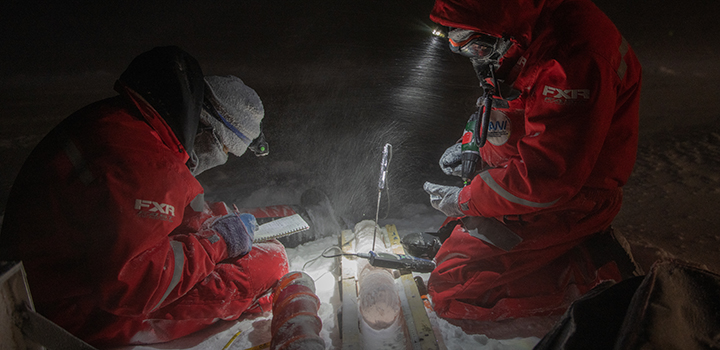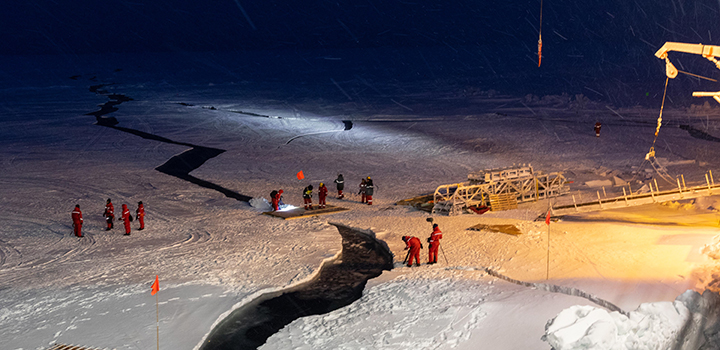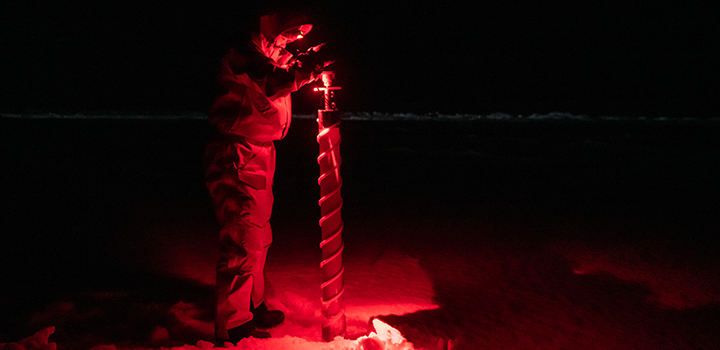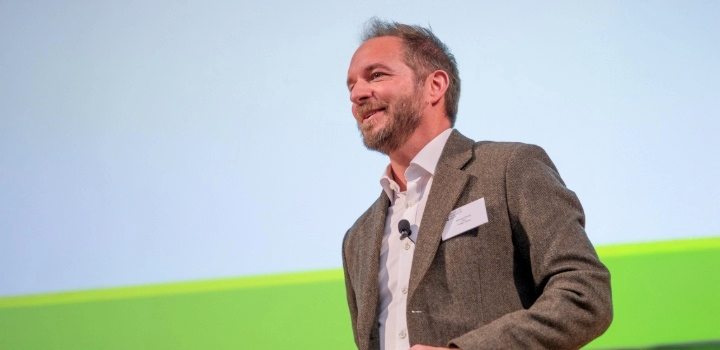New dataset reveals biological treasure trove of Arctic Ocean
By: News archive

A major new project will help benchmark biodiversity change in the Arctic Ocean and guide conservation efforts by identifying unique species and assessing their extinction risk.
Developed by an international team of scientists under the joint leadership of the University of East Anglia (UEA) in the UK and the Alfred-Wegener Institute Helmholtz Centre for Polar- and Marine Research (AWI) in Germany, the EcoOmics dataset will also support bioprospecting to tackle the shortage of antibiotics and antiviral medication, as well as reveal evidence of novel biology that might influence our understanding of the evolution of life on Earth.
The team - which includes researchers from the German Helmholtz Association, the German Research Foundation (DFG), the Joint Genome Institute (JGI, USA) and Earlham Institute (UK), as well as several other institutions - discuss the initiative and preliminary findings in the journal PLOS Biology, published today.
EcoOmics – the first large ‘omics’, or genome sequence dataset for any polar ecosystem – reveals a year in the biological life of the central Arctic Ocean with emphasis on microbiomes, communities of micro-organisms living together in a habitat.
Arctic ecosystems are among the most impacted by global warming and the Arctic Ocean serves as an indicator for the consequences of climate change, as well as the persistence of biodiversity on our planet.

Yet, due to logistical and accessibility challenges, the Arctic – especially the central Arctic Ocean – remains one of the most poorly understood environments.
The work by the EcoOmics team aims to address this, providing an ‘open access’ genomic resource for the scientific community. It uses data from samples gathered during the ground-breaking Multi-Disciplinary drifting Observatory for the study of Arctic Climate (MOSAiC) programme, which took place from September 2019 to October 2020.
The largest polar expedition in history, it saw research ship the RV Polarstern frozen into the Arctic sea ice and drift across the top of the Arctic Ocean. Hundreds of scientists conducted a range of co-ordinated marine, atmospheric, sea-ice related and other research dedicated to improving our understanding of the role of the Arctic Ocean in climate processes.
Prof Thomas Mock, of UEA’s School of Environmental Sciences, co-leads the EcoOmics project with Dr Katja Metfies from the AWI.
“This is the first and largest effort to sequence the central Arctic Ocean through space and time,†said Prof Mock. “It provides the first evidence of novel biology as the work was done in an area that has never been studied ever before using multiomics technology, that is, sequencing of genes, genomes and transcriptomes from natural microbial communities from the surface to the deep central Arctic Ocean.
Dr Metfies said: “This dataset will give us an unprecedented insight into the relevance of sea ice and its associated organisms to sustain the functionality and services of the Arctic marine ecosystem, which is facing the drastic pressure of climate change.
“MOSAiC gives us an important glimpse into the future of Arctic ecosystems beyond 2050, when the Arctic Ocean is predicted to be ice-free during summer. This integrative scientific approach is unprecedented for polar oceans, but it is needed to improve our projections of interacting species’ responses to climate change in the Arctic.â€

In particular, marine microbes in sea ice and seawater are a cornerstone in this ecosystem and play pivotal roles in climate feedbacks and in sustaining food webs, which are central for conservation and ecosystem services such as providing a habitat for species including fisheries. Microbes also serve as biological indicators due to their fast adaptive response to environmental change.
Initial results from the MOSAiC EcoOmics group provide the first evidence of habitat filtering in the Arctic Ocean, which describes the process by which habitat characteristics select for species adapted to them. Also, that the central Arctic Ocean is a “treasure trove†for discovering novel biology which has possibly evolved because of adaptive processes required to thrive in this harsh and understudied environment.
“MOSAiC EcoOmics is well placed to build the most comprehensive and integrative genetic and genomic inventory of any polar ecosystem on Earth,†said Prof Mock. “EcoOmics will contribute to conservation efforts and extend fundamental questions in biology including the evolution of life on planet Earth, which remains incomplete unless polar organisms are considered.
“Those organisms are likely a treasure trove for discovering novel biology because of their unique adaptation. How our understanding of global biodiversity will be influenced by novel polar biology remains to be seen, but our preliminary insights hold great promise.â€
‘Multiomics in the central Arctic Ocean for benchmarking biodiversity change’ is published in PLOS Biology on October 17, 2022.
Related Articles

Michael Grange appointed as new Royal Society Entrepreneur in Residence
Michael Grange has been appointed as the new Royal Society Entrepreneur in Residence for the Faculty of Science, following in the footsteps of Dr Soraya Jones who previously held the role.
Read more
Ultra low frequency gravitational waves detected in space
Researchers at the University of East Anglia are part of an international team that have found evidence for ultra-low-frequency gravitational waves in space.
Read more
Study of Earth's stratosphere reduces uncertainty in future climate change
New research led by the University of East Anglia (UEA) reduces uncertainty in future climate change linked to the stratosphere, with important implications for life on Earth.
Read more